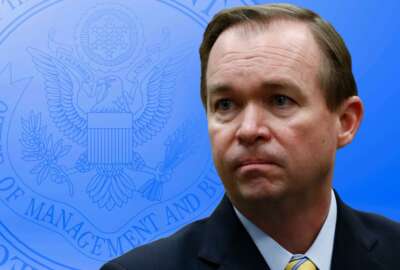 Exclusive
Exclusive Lawmakers have a unique role to play in government reorganization
The Trump administration's government reorganization directly impacts federal agencies, but Congress will have its work cut out as lawmakers balance their own...
Federal agencies have 180 days to submit their reorganization plans under President Donald Trump’s executive order, but they’re not the only ones with summer homework.
Lawmakers might be facing the unpleasant task of having to explain why a government office is closing in their hometown, or encouraging federal workers in their local communities to stay positive during hiring changes. And that doesn’t count the work they’ll be doing back in Washington as they legislate a proposed government overhaul.
“If it looks as if it’s a serious proposal that is coming from the administration, or having developed a lot of momentum in the Congress or elsewhere outside, internally within the agency, then people begin to look at it and say ‘OK, how’s this going to affect me, how’s it going to affect my district, my state?'” said Lee Hamilton, a professor of practice in the School of Public and Environmental Affairs at Indiana University, and founder of the Center on Congress at IU. “That’s a very common reaction from politicians, so they do begin to analyze it and how it will impact them.”
Hamilton is a former congressman and vice chairman of the 9/11 Commission.
“I am skeptical personally of most reorganization proposals,” Hamilton said. “That is, I’ve seen so many of them over so long, and seen such meager results from them. I have some doubts about them. Having said that, I have to acknowledge I’ve often participated in it. The 9/11 Commission recommended [creation of] the Department of Homeland Security. I don’t come to this with clean hands.”
Having gone through a reorganization, Hamilton said when it comes to a lawmaker’s priorities for their respective jurisdictions, the best way to stay involved is to start writing legislation.
“You don’t create a new department or abolish a department without congressional action, so they’re going to be heavily involved,” Hamilton said. “Now if it’s a matter of agencies issuing regulations, that’s a different ballgame. But restructuring government, certainly in any major way within an agency or creating a new agency or abolishing an agency, is going to involve legal action, which means passing a law, and that means both Congress and the president will be involved.”
By June 30, departments must submit a plan to OMB on how they will maximize employee performance. These plans should focus on reviewing and updating agency policy around limiting the use of paid administrative leave and using performance improvement plans to address poor performing employees.
OMB directed agencies to create a Manager Support Board comprised of internal experts on employee-labor relations to help managers agency-wide address performance and conduct issues.
The reorganization has to be directed from the top, and it has to be a collaborative process, said Tom Davis, a former Republican congressman from Northern Virginia, now with Deloitte Consulting.
“If it’s driven from the White House and OMB, you can generally get the agencies to fall in line, but you need a plan,” Davis told Federal News Radio.
Davis said personnel changes can go through the National Defense Authorization Act, or through government reform committees or attached to appropriations bills.
“Generally what’s happened in these committees, they end up being not legislative committees, they end up being investigative committees,” Davis said. “If you want to write successful civil service reform legislation, you better do it with the executive branch. You’ve got to get it signed by the president, but more importantly, you have to have an executive branch willing to implement what you do.”
What we want to do
Sally Jaggar, a National Academy of Public Administration senior adviser and former Government Accountability Office executive, said the reorganization’s impact on Congress is something that needs consideration, because federal agencies report to such a broad range of committees and subcommittees on Capitol Hill.
“I think it’s a real challenge to think about whether Congress would be willing to have all homeland security-related functions under the aegis of just one or two committees rather than divided among so many. And health and education and even civil service issues are divided among many different committees,” Jaggar said. “I do think there are a number of very complex issues that have to be thought through, and I’m hopeful with this kind of time frame and initiative that [Office of Management and Budget Director Mick Mulvaney] has set out, it would at least cause people to start tackling those,” Jaggar said.
During an April 11 press briefing on the reorganization plan, Mulvaney told reporters he “[didn’t] think we’ll be stepping on any toes.”
“At the end of the day, we’re really not taking away any of their jurisdictional authority,” Jaggar said. “We may be restructuring it. We may be saying, look, there’s certain things we don’t think the federal executive branch needs to do. But we’re not going to them and saying, Congress can’t do this anymore.”
Mulvaney said the White House is talking with congressional appropriators but not so far as to say “this is what we want to do.”
“Because we don’t know what we want to do yet,” Mulvaney said. “So it’s sort of hard to go to Congress and say, do this, we need to restructure. … There’s probably statute.”
A favorable climate
Dave Marin, a former staff director of the House Oversight and Government Reform Committee, said in an email to Federal News Radio that agency reform and reorganization isn’t new, and the administration will need to address recurring issues — particularly “congressional turf.”
“The biggest obstacle to reorganization and overcoming duplicative programs resides in congressional committees that don’t want to see their jurisdiction and clout diminished,” said Marin, who now is managing principal for Podesta Group Public Relations in Washington. “To succeed, some degree of ‘fast track’ authority will be needed. Presidents used to have that.”
Latest News on Congress
The other issues involve not “demonizing” the workforce, and be sensitive to the reality that “waste is marbled throughout the bureaucracy.”
Also by June 30, OMB will meet with agencies to review their high-level draft of their agency reform plans. In July, OMB will meet with CFO Act agencies and a limited number of others to provide feedback and identify actions that could be taken immediately.
Final reform plans are due to OMB by September as part of the 2019 budget proposal.
OMB says starting in February 2018 it will begin tracking progress on the governmentwide reform plan.
Mulvaney said he will submit a final plan to Trump for agency restructuring and reorganization by March 2018.
As for lawmakers, Davis said when it comes to politicians, reelection — and in this case midterms — is where you get started. Most members don’t have a lot of federal employees in their districts, and even those who do, want the government to work.
People get upset about hiring freezes, but those people who do have jobs might be able to do them better if they’re treated well, Davis said.
“I think members always tend to be parochial about that, you’re always protecting jobs,” Davis said. “Looking at this as a jobs corps is how members may look at it parochially, but at the end of the day we’re better off if we make government more efficient.”
Copyright © 2025 Federal News Network. All rights reserved. This website is not intended for users located within the European Economic Area.
Related Stories





